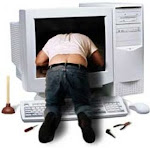Do you use an antivirus? I don't. I do have a free antivirus downloaded on my hard disk, but i haven't installed it. Truth is, if you are careful you won't need an antivirus. You'd think having one installed anyways won't make you loose anything right? Well partially right. An antivirus no matter how light, takes up RAM and processor speed and even your bandwidth. So to save your PC from a virus which may never come, you are making your PC handicapped. If you're using XP then having a light antivirus like AVG is a good idea. But Windows 7, pretty much takes care of itself. Just be sure not to auto play dubious pen drives and never to download a spyware remover from a site which tells you, you have spyware. Of course you should have one downloaded and ready to install just in case!
If anything goes wrong and a virus affects your computer just follow these steps:
1. Restart your PC
2. Start tapping the F8 key. The Windows Advanced Boot Options Menu appears
3. Ensure that the Safe mode option is selected, not Repair Your Computer
4. Press Enter. The computer then begins to start in Safe mode.
5. Now install the antivirus and scan your computer.
If anything goes wrong and a virus affects your computer just follow these steps:
1. Restart your PC
2. Start tapping the F8 key. The Windows Advanced Boot Options Menu appears
3. Ensure that the Safe mode option is selected, not Repair Your Computer
4. Press Enter. The computer then begins to start in Safe mode.
5. Now install the antivirus and scan your computer.


